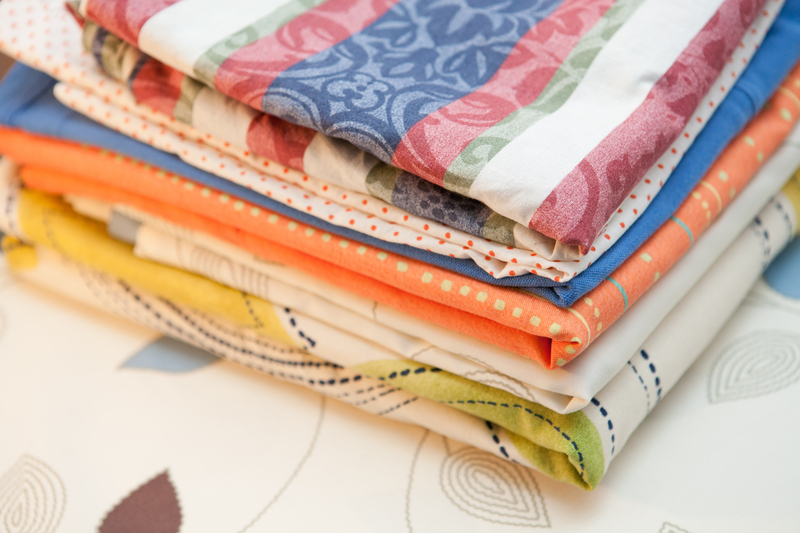Boost Your Spirits: Declutter Your Home
Posted on 25/12/2024
Understanding the Impact of Clutter
Clutter can have a profound impact on your life, often in ways you may not even realize. Research has shown that disorganized spaces are linked to increased levels of stress, anxiety, and even depression. When your environment is chaotic, it can lead to overstimulation and fatigue, making it difficult to concentrate and complete tasks.
A cluttered home can also negatively impact your relationships. It can cause tension among family members and make social gatherings more stressful. By understanding the impact of clutter, you can better appreciate the importance of creating a clean, organized living space.

Steps to Effective Decluttering
1. Set Clear Goals
Before you start decluttering, it's essential to set clear, achievable goals. Determine which areas of your home need the most attention and prioritize them. Having a clear roadmap will keep you focused and motivated throughout the process.
2. Start Small
Decluttering your entire home can be overwhelming, so it's best to start small. Choose a single room or even a specific area within a room. For instance, you might start with a drawer, a closet, or a bookshelf. Tackling smaller tasks first will give you a sense of accomplishment and make larger projects more manageable.
3. Sort and Categorize
Once you've chosen an area to declutter, start sorting through your belongings. Create categories such as "keep," "donate," "sell," and "discard." This will help you make informed decisions about what to do with each item. Remember, the goal is to reduce the number of items you have, so be honest with yourself about what you truly need and use.
4. Use the "One-Year Rule"
A helpful guideline is the "one-year rule." If you haven't used an item in the past year, it's likely that you don't need it. This rule can be particularly useful when dealing with clothing, kitchen gadgets, and other household items. Be ruthless in your decluttering process to create more space and reduce clutter.
5. Invest in Storage Solutions
Effective storage solutions can make a significant difference in maintaining an organized home. Invest in shelves, bins, and organizers to keep items neatly stored and easily accessible. Labeling containers can also help you quickly find what you need and keep your space tidy.
6. Maintain Regular Decluttering Habits
Decluttering is not a one-time task but an ongoing process. Establish regular decluttering habits to prevent clutter from accumulating again. Set aside time each month to reassess your belongings and make adjustments as needed. By incorporating decluttering into your routine, you can maintain a clutter-free home in the long run.
Tips for Specific Areas
Living Room
The living room is often the heart of the home, where families gather and entertain guests. To declutter this space, start by removing items that don't belong there, such as mail, toys, and miscellaneous items. Invest in decorative baskets or storage ottomans to keep remote controls, magazines, and other essentials organized and out of sight.
Bedroom
Your bedroom should be a peaceful retreat, free from distractions. Begin by decluttering your nightstands and dresser tops. Store out-of-season clothing in under-bed storage bins or vacuum-sealed bags to free up closet space. Keep your bedside table clear of unnecessary items, allowing only essentials like a lamp, a book, or an alarm clock.
Kitchen
The kitchen is prone to becoming a clutter hotspot due to its high-traffic nature. Start by decluttering countertops, removing appliances and utensils that you don't use daily. Organize your pantry by grouping similar items together and using clear containers to store dry goods. Regularly clean out your refrigerator and discard expired or unused food items.
Bathroom
Small bathrooms can quickly become cluttered with toiletries and grooming products. Declutter your bathroom by sorting through your products and disposing of anything that is expired or unused. Use drawer organizers and shelves to keep items neatly arranged. Consider using over-the-door racks or shower caddies to maximize storage space.
Home Office
A clutter-free home office is essential for productivity and focus. Start by clearing your desk of unnecessary papers, gadgets, and office supplies. Use filing cabinets or digital storage solutions to organize important documents. Keep cords and cables tidy with cable management systems to create a clean and efficient workspace.

The Emotional Benefits of Decluttering
Decluttering your home is not just about creating a tidy space; it also offers numerous emotional benefits. A clean, organized environment can reduce stress and anxiety, leading to improved mental health. When you declutter, you create a sense of order and control, which can be incredibly empowering.
Moreover, decluttering can boost your mood and increase your overall happiness. It allows you to let go of the past and make room for new experiences and opportunities. By eliminating physical clutter, you also clear your mind, making it easier to focus and be productive.
Finally, a clutter-free home can enhance your relationships. It fosters a more peaceful and harmonious living environment, reducing tension and conflicts. You'll also feel more comfortable inviting friends and family over, leading to more social interactions and connections.
Conclusion
Decluttering your home is a powerful step towards improving your overall well-being. By understanding the impact of clutter, taking effective steps to declutter, and maintaining regular decluttering habits, you can create a clean, organized, and stress-free living space. The emotional benefits of decluttering are profound, leading to reduced stress, increased happiness, and stronger relationships. Start your decluttering journey today and experience the transformative effects on your life.
Latest Posts
Time Estimate for Moving House
Career Shifts: Finding Balance Between Work and Home
Tips for Moving a Computer Securely
House moves and hare care: Preparing your rabbit for the journey







